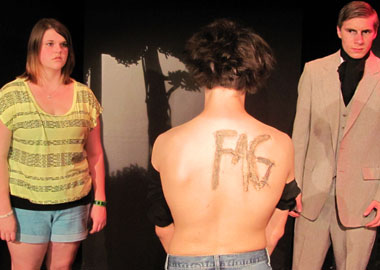With the issue of teen bullying now (belatedly) a national subject of concern, it wasn’t quite a surprise to find two plays performed in the area last week dealing with the topic. While The Strength of Stones, at Smith College, and As It Appears, at Easthampton High School, had utterly different plotlines, both focused on the terrible tortures adolescents can inflict on their peers.
Playwright Richard Ballon was moved to write As It Appears by a gruesome incident that happened at the Northfield Mount Hermon School. There, in 1999, a boy carved the word “homo” into a classmate’s back with a penknife. Ballon’s play imagines the aftermath of a similar, fictional incident, with the victim carrying the legible scar (this one spelling out “fag”) to a new school, where he’s befriended by a sympathetic girl and visited by the ghost of a gay boy who hanged himself after being outed.
The short one-act was performed last week at EHS as part of Pride Week events, a co-production of the Drama Club and Gay-Straight Alliance. Five performances were given during the school day, followed by talkbacks. Director Tom Smith later recalled that in each discussion, students picked up on the play’s parallels to the recent news story about Mitt Romney’s homophobic prep-school bullying, when he forcibly sheered a boy’s bleached-blonde hair and taunted another student with shouts of “Atta girl!”
The Strength of Stones, by Smith student Samantha Noble, was written as part of the on-campus Kahn Institute’s interdisciplinary exploration this year on the theme of Evil. Set in an all-girl Catholic high school, it begins with a student defending her friend from a couple of class bullies by tricking them into turning against each other. But it grows into a darker study of the girl’s twisted sense of saintly suffering, as she herself becomes the bully, intentionally hurting her friend via a betrayal that she likens to that of Judas, “the most divine of all the apostles” because he “gave Christ the gift of suffering [without which] His purpose on earth could not be achieved.”
There’s an unstated lesbian subtext in the play, but what Noble’s and Ballon’s scripts really have in common, in addition to episodic, slightly surreal stagecraft, is an awareness of the self-justifying fear and hatred that fuels physical or psychological violence. Both acts of brutality depicted in the plays spring from a drive for control—of another’s actions, appearance or basic sense of self.
In the talkback after the performance I saw at EHS, attended by parents and faculty as well as students, the conversation turned to the wider community’s responsibility to respond to words and actions that threaten individuals’ right to be themselves. “Bullying doesn’t happen without support for it,” as one person put it. Complicity is just as harmful as the violent act itself, and even silence is, in effect, complicity.
In As It Appears, we learn that the scarred boy’s best friend was part of the posse that attacked him. When the friend later apologizes with the explanation that he was just an onlooker, the boy responds, “You may not have held the knife, but it’s your handwriting.”
Contact Chris Rohmann at StageStruck@crocker.com.



